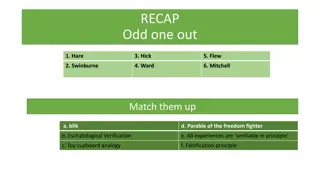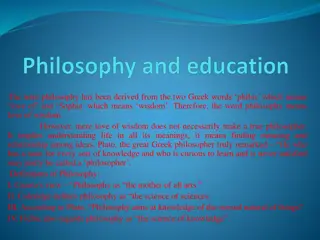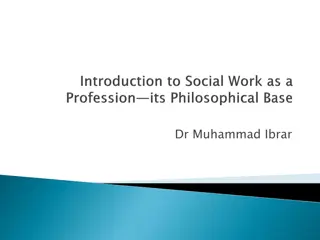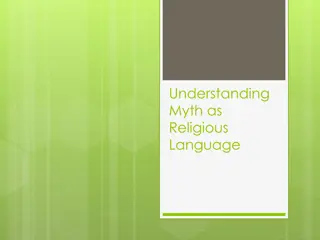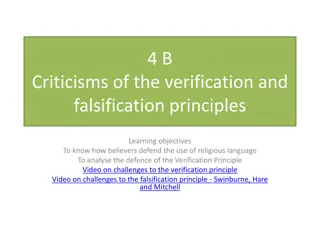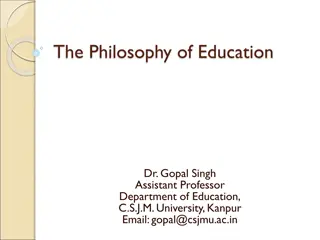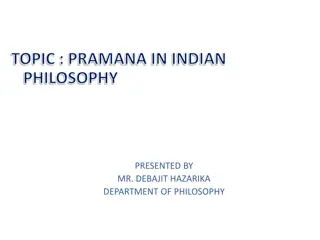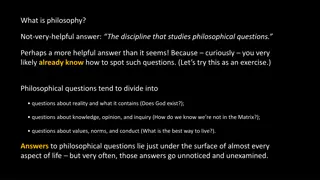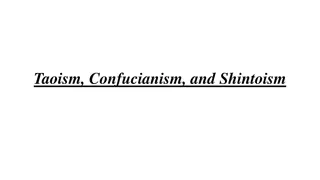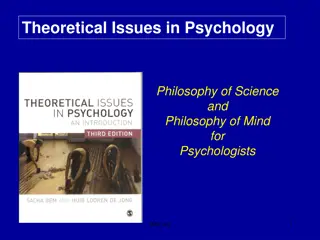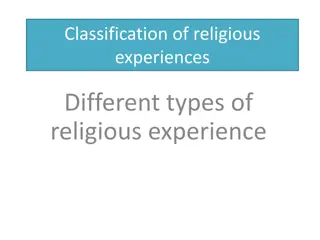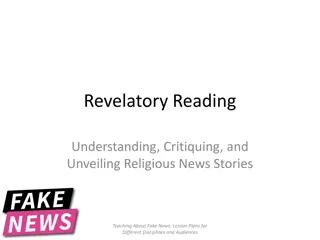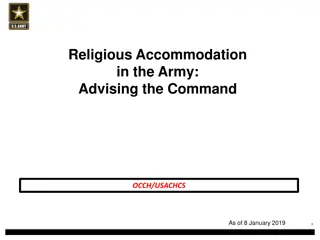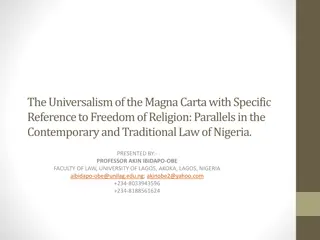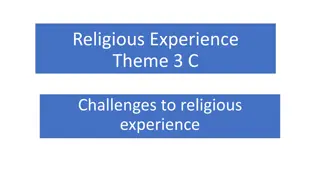Exploring Analogy and Religious Language in Philosophy
Dive into key terms like disclosure, qualifier, and models in the context of analogy and religious language as discussed by philosophers like Aquinas and Ian Ramsey. Explore concepts of language, analogy, and the application of human understanding to divine attributes.
Download Presentation

Please find below an Image/Link to download the presentation.
The content on the website is provided AS IS for your information and personal use only. It may not be sold, licensed, or shared on other websites without obtaining consent from the author. Download presentation by click this link. If you encounter any issues during the download, it is possible that the publisher has removed the file from their server.
E N D
Presentation Transcript
Recap task Think of fifteen key terms associated with analogy Choose nine and add to the bingo grid Play bingo
Recap Aquinas on analogy 1. Language is _____________ if it has the same meaning in each case e.g. _________ 2. Language is ______________ if it has a different meaning in each case e.g. ____ 3. An analogy is ______________ 4. It is correct to say God is good because God is the _______ of goodness analogy of _______ 5. An analogy of _________ says that God has the same qualities in different __________ to humans
4 C Religious language as non-cognitive and analogical: Ian Ramsey Specification content Proportion and attribution (St Thomas Aquinas) and qualifier and disclosure (Ian Ramsey). Ian Thomas Ramsey was Professor of the Philosophy of Religion at the University of Oxford, and Bishop of Durham from 1966 until his death in 1972. 1957 book Religious Language: an Empirical Placing of Theological Phrases
Key terms Disclosure: where something is made known where previously it was hidden or unknown Qualifier: a term used by Ramsey where a word or phrase is used to give a deeper meaning to the model that the qualifier precedes
Models A model is a situation with which we are all familiar and which can be used for reading another situation . This is a way we often explain things in everyday life. We try to help people understand by using words or examples that they already understand (a model). In this sentence, good is a model for GodGod is good
When we apply a human understanding of good to God, it is a model for understanding God s goodness. Good is a word we use in ordinary life e.g.
Qualifiers To understand God s goodness the model needs qualifying (adjectives and adverbs). The qualifier, that God is infinitely good , has to be added to the expression God is good. Such qualifiers will deepen our understanding of what it means that God is good. We might not understand and comprehend exactly the nature of God, because qualifiers such as infinitely or perfectly are in many ways beyond our imagination, but it is a method of speaking about God positively which aims to avoid either limiting God or speaking incomprehensibly. Ramsey claimed that qualifies can lead to the light dawning and penny dropping . What does this mean mean? What does Ramsey mean by odd words? Give an example
Key phrases in his work: Ramsey uses these words and phrases to show what happens when the qualifier works . The basic idea is that there can be an impersonal situation, where a word odd to that situation is heard. This can lead to the situation changing, it can become more personal, take on a depth. A new dimension has been entered and the disclosure leads to commitment. The situation has grounding in experiences odd words; light dawns; penny drops; personal; evokes disclosure
The example of the judge Well, Sammy Complete task 5 on page 8 add key terms, examples and detailed explanations. Extension explain the Sammy example
Overview What these analogical words do, is to provide us with an insight into God s character even though we cannot fully understand it. For Aquinas, this leaves a fair measure of agnosticism about the real nature of God, or the concrete character of God s perfections i.e. analogical language leaves room for the sense of mystery of the divine being, without falling into the traps of extreme equivocalism in which we cannot speak meaningfully of God at all.
DIL - Consolidation task 1. Complete all the tasks in the booklet up to page 10 this includes challenges and strengths of analogy. S group Summary of analogy watch this presentation, add to your notes How to write an essay on analogy Eduqas watch this presentation Read the John Hick extract pages 83-85. 1. Write a one page revision summary of Religious language as non- cognitive and analogical - Include Aquinas and Ramsey and an explanation of Analogy of Being why can we make a comparison between God and humanity. 2. Complete pages 11 and 12 of the booklet F group
4 C Challenges including how far analogies can give meaningful insights into religious language. A consideration of how these two views (Aquinas/Ramsey) can be used to help understand religious teachings.
Challenges including how far analogies can give meaningful insights into religious language. Hume Analogy only works if the two things being compared are similar. We don t know what we mean when we use the word God therefore any attempt to compare anything to God fails.
Challenges including how far analogies can give meaningful insights into religious language. Aquinas and Ramsey assume God exists and created the universe Aquinas also believed that humans were created in the image and likeness of God as is stated in Genesis. If we accept these assumptions then the claims about analogy are persuasive. However, if God doesn t exist there is no point of comparison and analogies fail.
Challenges including how far analogies can give meaningful insights into religious language. Another criticism, is that of Richard Swinburne, who argues that we don t really need analogy at all. When we say God is good and humans are good , we may be using good to apply to different things, but we are using it to mean the same thing: i.e. we are using the word good univocally. Or, as we know nothing about God we can only use the words equivocally we know God is different, but we don t know how God is different so we can t talk meaningfully about God. analogy of attribution admits of no control . As God is infinite, only those terms capable of infinite expansion are
Can you add any other ideas? Weaknesses Weaknesses Strengths Strengths It is not always clear exactly in what respects two different things are being considered similar in what respects might the love or the justice of God resemble our own, and how they are different Blackstone analogies are not helpful Connection between creator and creation C. Stephens Evans mystery . . . Analogies are useful in many contexts,
Evaluating analogy Analogy In Aquinas view, it was important to remember that God cannot be wholly understood, and that we will never reach a clear understanding where we comprehend exactly what God is. 1. Read the statements 2. Decide if they support or reject the use of analogy in religious language 3. Can you match any together in pairs or small groups 4. Complete tasks 6 and 7
So what do you think? Does Analogy offer a way of giving religious language meaning? Do its strengths outweigh its weaknesses? Does all religious language have to be analogical or do we need it alongside other approaches potentially? Which approach to religious language do you prefer: Applying Logical Positivism or Using analogy? Explain.


